Books by Faculty Members 2017-19
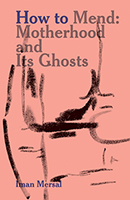 |
How to Mend: Motherhood and Its Ghosts By Iman Mersal (MLCS), Translated by Robin Moger 2018, MIT Press A new narrative of motherhood, moving between of interior and exterior landscapes, woven of diaries, readings, and photographs. Iman Mersal intricately weaves a new narrative of motherhood, moving between interior and exterior landscapes, diaries, readings, and photographs to question old and current representations of motherhood and the related space of unconditional love, guilt, personal goals, and traditional expectations. What is hidden in narratives of motherhood in fictional and nonfictional texts as well as in photographs? |
 |
Music, Sound, and Architecture in Islam Edited by Michael Frishkopf (Music) and Federico Spinetti University of Texas Press, 2018 Representing the fields of ethnomusicology, anthropology, art history, architecture, history of architecture, religious studies, and Islamic studies, the volume's contributors consider sonic performances ranging from poetry recitation to art, folk, popular, and ritual musics-as well as religious expressions that are not usually labeled as "music" from an Islamic perspective-in relation to monumental, vernacular, ephemeral, and landscape architectures; interior design; decoration and furniture; urban planning; and geography. Underscoring the intimate relationship between traditional Muslim sonic performances, such as the recitation of the Qur'an or devotional songs, and conventional Muslim architectural spaces, from mosques and Sufi shrines to historic aristocratic villas, gardens, and gymnasiums, the book reveals Islam as an ideal site for investigating the relationship between sound and architecture, which in turn proves to be an innovative and significant angle from which to explore Muslim cultures. |
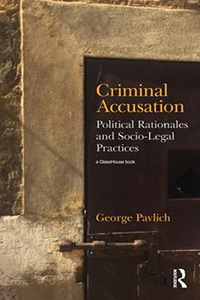 |
Criminal Accusation: Political Rationales and Socio-Legal Practices By George Pavlich (Sociology) Routledge, 2018 Accusing someone of committing a crime arrests everyday social relations and unfurls processes that decide on who to admit to criminal justice networks. Accusation demarcates specific subjects as the criminally accused, who then face courtroom trials, and possible punishment. It inaugurates a crime's historical journey into being with sanctioned accusers successfully making criminal allegations against accused persons in the presence of authorized juridical agents. Given this decisive role in the production of criminal identities, it is surprising that criminal accusation has received relatively short shrift in sociological, socio-legal and criminological discourses. In this book, George Pavlich redresses this oversight by framing a socio-legal field directed to political rationales and practices of criminal accusation. The focus of its interrogation is the truth-telling powers of an accusatory lore that creates subjects within the confines of socially authorized spaces. And, in this respect, the book has two overarching aims in mind. First, it names and analyses powers of criminal accusation - its history, rationales, rites and effects - as an enduring gateway to criminal justice. Second, the book evaluates the prospects for limiting and/or changing apparatuses of criminal accusation. By understanding their powers, might it be possible to decrease the number who enter criminal justice's gates? This question opens debate on the subject of the book's final section: the prospects for more inclusive accusative grammars that do not, as a reflex, turn to exclusionary visions of crime and vengeful, segregated, corrective or risk-orientated punishment. Highlighting how expansive criminal justice systems are populated by accusatorial powers, and how it might be possible to recalibrate the lore that feeds them, this ground-breaking analysis will be of considerable interest to scholars working in socio-legal research studies, critical criminology, social theory, postcolonial studies and critical legal theory. |
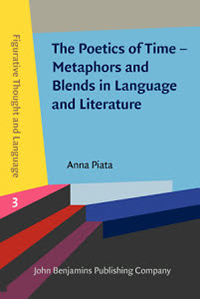 |
The Poetics of Time - Metaphors and Blends in Language and Literature How does the concept of time, elusive and inconceivable as it may be, lend itself to verbal creativity? Is it possible to trace something like a "poetics of time"? This book embarks on this endeavor initiated by the assumption that verbal creativity can shed some new light on our understanding of time, challenging everyday linguistic patterns and manipulating mental representations in unforeseen ways. Drawing on empirical evidence from Modern Greek poetry, the book offers a unified account of time conceptualization along a continuum of various degrees of non-conventionality. It also shows, unlike what has been traditionally assumed in the literature, that creativity in the expression of time is not limited to metaphor but extends to other figurative tropes that are perhaps specific to poetry. Poetry thus transpires as an ideal testing frame for exploring temporal cognition and meaning construction alike.
|
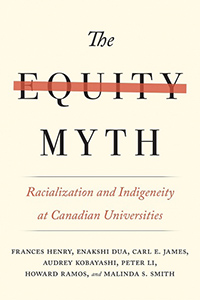 |
The Equity Myth: Racialization and Indigeneity at Canadian Universities By Frances Henry, Enakshi Dua, Carl E. James, Audrey Kobayashi, Peter Li, Howard Ramos and Malinda S. Smith (Political Science) UBC Press, 2017 A landmark study on racism in Canadian universities, The Equity Myth shows how the goal of achieving equity in higher education has been consistently promised, but never realized for racialized and Indigenous faculty members. It further reveals that the policies and diversity initiatives undertaken so far have only served to deflect criticism of a system that is doing little to change itself. |
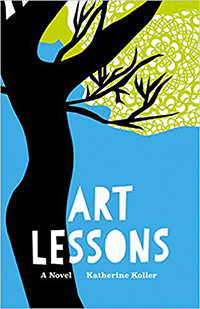 |
Art Lessons Katherine Koller (English & Film Studies) Enfield & Wizenty Pulbishers, 2017 Art Lessons is in the voice of Cassie from a seven-year-old to seventeen, when she finally leaves home for art school. She discovers the transformative power of visual art in herself and on the lives of others. Cassie lives in a family of sports nuts, she's a loner and easily distracted by boyfriends, but in love with trees, her inspiration for drawing, and the process of art-making, which to her feels like floating. While unlikely teachers of all ages challenge her, her Polish grandmother, Babci, is an intuitive guide on Cassie's path to becoming an artist. Through her own heightened observational skills and awareness of her difference, Cassie is saved by her art, changing as the trees she continues to draw over time. |
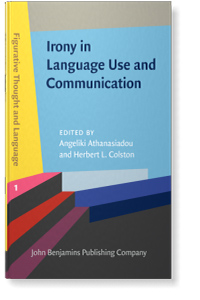 |
Irony in Language Use and Communication Editors: Angeliki Athanasiadou, Aristotle University and Herbert Colston (Linguistics) John Benjamins Publish Company, 2017 The volume provides original research and analyses of the multi-faceted conceptual and verbal process(es) of irony. Key topics explored include interdisciplinary perspectives and approaches to the study of irony. Collectively, the papers examine irony from psychology, embodiment studies, philosophy, cognitive linguistics, the connection and impact of irony on culture and (media) communication, different approaches to verbal irony and others-ultimately attempting to model the mechanisms underlying ironic forms and the psycholinguistic motivations for their investigation. The comprehensive treatment of these issues is fundamental for future research on irony and related phenomena, particularly on questions of its usage, the diversity and/or unity of irony and ultimately the interrelationships between figurative thought and language. |
 |
Migration, Health and Survival: International Perspectives Editor: Frank Trovato (Sociology) Edward Elbar, 2017 Migration, Health and Survival offers a comparative approach, bringing together leading international scholars to provide original works from the United States, Canada, Australia, France, Germany, England and Wales, Norway, Belgium, and Italy.Variations in physical and mental health and mortality among migrants in relation to their host populations are examined and analysed in detail, with specific discussion of: the immigrant health and mortality advantage; the healthy migrant hypothesis; migrants as vulnerable populations; the long-term effects of acculturation on health; fast epidemiological transition among migrants; and the intergenerational transmission of mortality risk. The contributions in this volume enhance the reader?s understanding of immigrant health and mortality conditions across these leading countries of immigration in the western world. This is an important reference for researchers of migrant studies as well as teachers of graduate level courses in population studies and allied disciplines. |
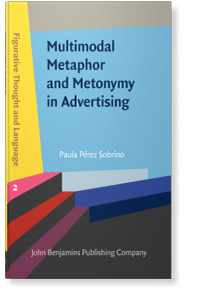 |
Multimodal Metaphor and Metonymy in Advertising Edited by Herbert Colston (Linguistics) John Benjamins Publishing Company, 2017 Metaphor and metonymy appeal to us because they evoke mental images in unique but still recognisable ways. The potential for figurative thought exists in everyone, and it pervades our everyday social interactions. In particular, advertising offers countless opportunities to explore the way in which people think creatively through metaphor and metonymy. The thorough analysis of a corpus of 210 authentic printed advertisements shows the central role of multimodal metaphor, metonymy, and their patterns of interaction, at the heart of advertising campaigns |
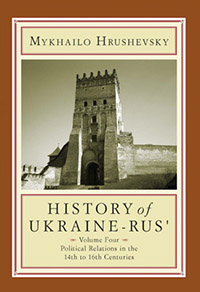 |
History of Ukraine-Rus'. Volume 4, Political Relations in the 14th to 16th Centuries Mykhailo Hrushevsky CIUS Press, 2017 With volume 4, Mykhailo Hrushevsky begins the second, 'Lithuanian-Polish,' cycle of his History of Ukraine-Rus', which extends from the fourteenth-century collapse of Ukrainian statehood to the recovery of the late sixteenth century. Volume 4 covers political life, while volumes 5 and 6 deal with society and culture. |
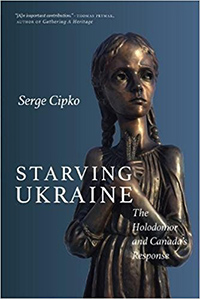 |
Starving Ukraine: The Holodomor and Canada's Response Serge Cipko (CIUS) University of Regina Press, 2017 In 1932-33, a famine - the Holomodor ("extermination by hunger") - raged through Ukraine, killing millions. Although the Soviet government denied it, news about the catastrophe got out. Through an extensive analysis of the newspapers, political speeches, and protests, Starving Ukraine examines both Canada's reporting of the famine and the country's response to it, highlighting the importance of journalists and protestors. |